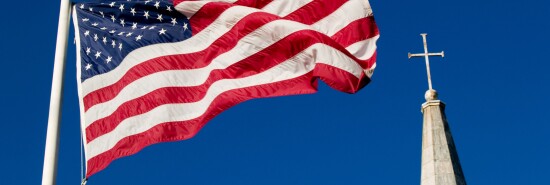
Political power and the paradox of Easter
Ian Church
Imagine you’re a member of a group of people oppressed by vast and unfeeling governmental forces. You pay taxes to a government that doesn’t represent you or your values. You’re shocked by the godlessness of the elites championed in broader society, and you’re disgusted by the moral depravity of the cultural influences imposed upon you and your children.
Now imagine that someone rises among you ideally positioned to free you and your people from their oppression. Understandably, this person attracts throngs of devoted followers. And understandably, it’s easy to get caught up in the fanfare and the energy of the moment. This is it. Freedom is coming.
TRUMP AND THE RELIGIOUS RIGHT’S UNHAPPY ENDING
But everything changes when this leader is willingly arrested.
He doesn’t protest. He doesn’t call on his followers to take up arms, “fight like hell,” or even organize a demonstration. Instead, this leader shows tremendous care for his captors and their well-being. Like a lamb led to the slaughter, he does nothing to escape the situation. Indeed, he willingly dies a horrific and public death at the hands of those same oppressive governmental forces.
How surprised would you be to learn that that leader’s death did bring about freedom? No, not freedom from those vast and unfeeling governmental forces, but freedom from sin itself. How surprised would you be to learn that this leader is indeed a king, but his kingdom is not of this world? And how surprised would you be to learn that, paradoxically, if you wanted to change the depraved and godless culture surrounding you, it wouldn’t come via forceful revolution? Instead, it would come via radical love, even for your enemies, a love so radical it might even require giving up your life.
Of course, we know this Easter story. Jesus Christ, the messiah, riding on a donkey with a crowd going before him spreading their cloaks and palm branches on the road. The crowd, along with Jesus’s disciples, was hoping that he’d be their new triumphant king and usher in the promised return of the throne of David. Through force of arms and a campaign of violent liberation, they hoped he’d overthrow Rome and set them free.
And yet, to the surprise of the crowd and his disciples, Jesus rejected political power. Instead, he chose to die a humiliating, sacrificial death. He did indeed restore the throne of David, but Christ’s throne is a heavenly throne. He set his people free, but not from Roman oppression and not through military might: By his death and subsequent resurrection, he set them free from their sins.
While many of us reflect on this story every year, its familiarity dampens just how surprising, jarring, and paradoxical it truly is. If we’re studying it carefully, it should challenge how we often consider Christianity’s relationship with political power. It shows us a Christianity that revolutionizes culture while enduring oppression and reminding Christians repeatedly that this world is not their home. The Christianity that radiates through the Gospels and throughout the New Testament doesn’t aim to change our culture by stacking the courts, political coercion, or violent insurrection; instead, it institutes dramatic change through radical, sacrificial, and even humiliating love, especially toward the downtrodden, the helpless, and the “least” of society.
Through the Easter story, we’re taught that Christianity’s relationship to politics shouldn’t be one of domination but one of service, of loving other people in self-sacrifice. Through the Easter story, we’re shown how “Christian nationalism” is a genuine absurdity.
Authentic Christianity simply cannot be associated with any political party’s machinations. Paradoxically, if Christians want their faith to wash over the political landscape in this country and for their neighbors to see the beauty of the Good News, it won’t come by seeking political power and subjugating dissent. It will come from a radical love for the other, an image no more beautifully realized than that of the King of Kings on the cross, laying down his life for us so that we may live.
CLICK HERE TO READ MORE FROM THE WASHINGTON EXAMINER
Ian Church is an associate professor of philosophy at Hillsdale College and the director of the Arete Research Center for Philosophy, Science, and Society. He is also the principal investigator of the “Launching Experimental Philosophy of Religion” project, funded by the John Templeton Foundation.
